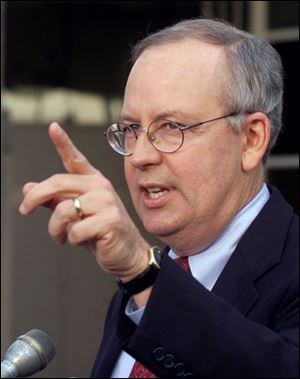
Reform law opens doors to abuses, Starr tells forum
12/19/2003
Kenneth Starr: He argued the challenge to the law before the U.S. Supreme Court, but lost the 5-4 decision.
COLUMBUS - Former Whitewater independent counsel Kenneth Starr said that federal campaign-finance reform upheld last week by the U.S. Supreme Court amounts to the “criminalization of politics.”
It s an argument he lost before the court, which voted 5-4 to uphold major provisions of a law designed to dampen the influence of unregulated “soft money” on elections.
Opponents of the Bipartisan Campaign Reform Act, also known as McCain-Feingold, including Mr. Starr and the Ohio Republican and Democratic parties, suggested during a forum yesterday that the law could redirect millions of dollars to nonprofit organizations that act like political parties but are not subject to the same regulations.
The law has created confusion as to how state parties would be affected during federal election years such as 2004, when offices ranging from president to Ohio Supreme Court justice will be on the same ballot.
Any activities deemed to benefit a federal candidate, such as the printing of candidate slate cards or get-out-the-vote efforts, would have to be financed from party federal accounts subject to the new federal rules.
“It may well be that states will take a serious look as to whether they want to have elections at the same time as the federal elections,” Mr. Starr said. “Five states do not. They will enjoy greater autonomy, free of the regulatory activity of the federal government.”
The federal law requires all contributions to a political party to be publicly disclosed, including previously exempt donations made to accounts to cover party operating expenses like staff salaries and phone banks. At the same time, it opens the door for the first time for corporations and labor unions to openly contribute to such accounts.
It also would put an end to anonymously financed independent issue-advocacy commercials targeting specific candidates within 60 days of a general election. Ohio has become fodder for such campaigns in recent years, particularly in races for state Supreme Court.
Kent Markus, a Capital University Law School professor, suggested opponents of the law don t want to admit that a problem exists: Many voters are disgusted by politics.
“I think one of the substantial reasons they feel that way is they believe, and I think with very good basis, that money buys influence and, in particular, access, and that there is a nefarious element in the process to money being allowed to buy access,” he said. “The ban on soft money is aimed at trying to place hurdles and barriers in between the direct quid-pro-quo exchange of dollars for influence and access.”
For 21/2 years, the Ohio General Assembly has sat on a proposal to adopt many of the same federal provisions into state election law.
“A lot of people used [the court challenge] as an excuse not to move forward. That excuse is no longer valid,” said state Sen. Randy Gardner (R., Bowling Green), the bill s sponsor, who did not participate in yesterday s forum.
Last week s ruling prompted Secretary of State J. Kenneth Blackwell, a Republican, to ask the state political parties to liquidate their state party operating accounts fueled by anonymous contributions. Ohio Republican Chairman Bob Bennett countered that the GOP is in compliance with the law and that state operating accounts remain legal.